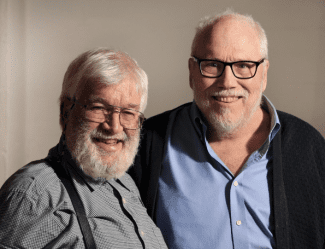As the years tick on it seems the word "single" becomes louder and more lonely every time you say it or check off the corresponding box on medical forms. It use to be a nice word, a liberating word, freedom. Aging LGBTers are finding it may be a word that instead of liberating, may be pigeonholing you into an uncomfortable category, a category where no one legally can help you or speak for you.
Some older LGBTers have it good enough that they now have the ability to check the "married" box, but is it always the best thing to do? Dispatch.com's article "Older Same-sex Couples Face Specific Challenges" tells us of what our LGBT elders are doing now since they can legally marry. There are great benefits to being married, but some are choosing not to marry due to certain consequences.
“Our seniors are running off and getting married not only out of love but because they can finally protect each other and the lives they’ve created together,” said Lori Gum, program and Pride coordinator for Stonewall Columbus, a gay-rights organization.
Largely invisible until very recently, there are about 3 million Americans age 60 or older who are lesbian, gay, bisexual or transgender, experts say. That number is expected to double by 2030, said Grant Stancliff, spokesman for the advocacy group Equality Ohio. Baby boomers are the first generation of LGBT people to have lived openly gay or transgender lives.
Though older LGBT adults generally express general satisfaction with their lives, they often face discrimination based on their sexual orientation, as well as their age, Stancliff said. They have higher disability rates, fewer opportunities to save for retirement, and many deal with mental-health concerns that spring from a lifetime of discrimination and stigma.
They’re also twice as likely to be single and three times more likely to be childless, compared with their heterosexual peers, making them more reliant on friends and community members than their families, he said. This has been problematic because so many of the country’s laws and policies have recognized only a person’s legal and biological family members, often leaving out their life partners.
…
But as a result of the Supreme Court’s gay-marriage decision, same-sex spouses are entitled to equal protection under the laws as heterosexual couples. They can visit their loved ones in hospital units routinely restricted to immediate family members. They can oversee their treatment and medical decisions. And they can ask nurses and doctors for information, Gum said.
Same-sex spouses also will now enjoy all state tax and spousal benefits in the event of divorce or death. That includes access to a spouse’s retirement benefits or survivor benefits under Social Security, accumulation of marital property and inheritance in the absence of a will.
…
Still, too many older same-sex couples are afraid to get married because it could “out” them in a way that might expose them to discrimination or harm, said Jim Ryan, a local consultant and trainer who works to raise awareness about LGBT issues. They also might not believe that marriage equality is here to stay.
And LGBT people still lack several other basic protections in the areas of housing, employment and accommodations.
“A same-sex couple can get married on a Saturday, and when the marriage announcement appears in the paper on Monday, one or both spouses could be fired, or they could be evicted from their apartment, simply for being LGBT,” Ryan said. – dispatch.com
It's very upsetting that LGBTers can still lose their job because they are human and love.
Would you not get married to protect your job?
And for those of us that haven't found that special someone(s0, do you worry about getting older and being single? Is it more a romantic worry, lack of love, or is it a worry that there will be no one to take care of you as you get older?
For the entire story, go to The Columbus Dispatch at dispatch.com


